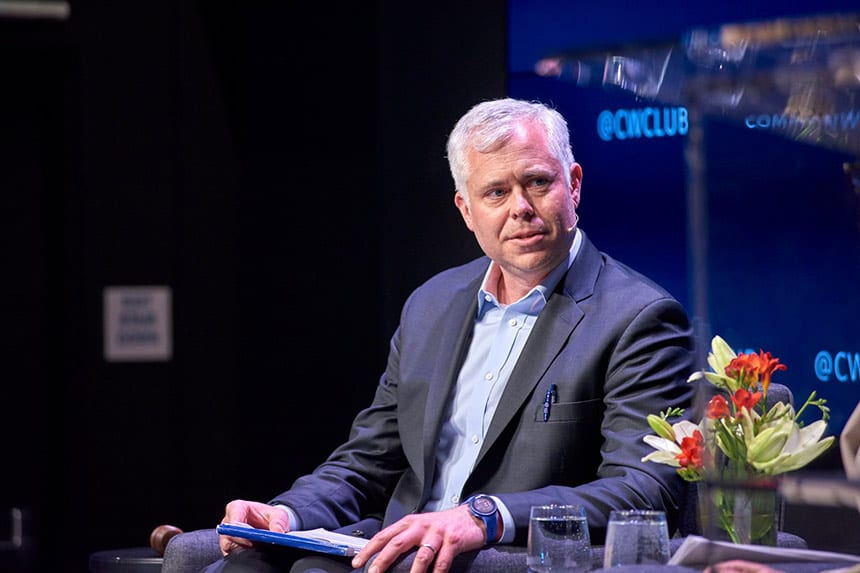
By Andrew Cohen
Chris Hoofnagle sees his journey at Berkeley Law as reflective of the school itself.
“It’s a visionary institution,” he says. “In my years here I have only found encouragement to do new things.”
His newest role: becoming a member of Berkeley Law’s teaching faculty with security of employment. But Hoofnagle has been part of the school since 2006 — and a core part of its top-ranked intellectual property law program — teaching courses on the regulation of technology and conducting path-breaking research.
“This role brings a renewed focus on teaching,” he says. “Technology is going to change both law and practice profoundly. Lawyers of the future will have to understand how information flows, how the transition from a world of information scarcity to one of information glut affects decision-making processes, and how legal reasoning will influence and be influenced by computer ‘reasoning.’”
A faculty co-director of the school’s renowned Berkeley Center for Law & Technology, Hoofnagle helped create the Privacy Law Scholars Conference, which has defined and incubated the field of information privacy. With the growing reliance on technology amid the COVID-19 pandemic, he views the center’s work as more vital than ever.
“IP was the tip of the spear for technology instruction in law schools. BCLT has helped the school, and in the process legal education generally, to see how important familiarity with technology more broadly is to understanding society,” he says. “I want to keep us on the cutting edge — not just in privacy, security, and computing, but also in wet sciences where we are going to see developments that will shift fundamental assumptions about the limits of humanity.”
Author of the 2016 book Federal Trade Commission Privacy Law and Policy, Hoofnagle is writing a new book on quantum technologies with computer scientist Simson Garfinkel. It aims to illuminate quantum computing, communications, and sensing technologies — and to probe how they will change relationships among governments, companies, and individuals.
“It is a coup for Berkeley Law to have Chris Hoofnagle in this new and exciting role,” says Boston University law professor and MacArthur Fellow Danielle Citron. “Chris is a privacy rockstar. He has made an indelible mark on our thinking, legislating, and law enforcement about information privacy.”
Creative in the classroom
This fall, Hoofnagle will teach Cybersecurity in Context with Professor Jennifer Urban ’00. Exploring various lenses that shape and interpret the problem of complex systems security, the course amplifies how this “security” is regulated by the common law, insurance, statutes, administrative regulations, international agreements, and even social norms.
He will also teach Torts and a new course to help lawyers better understand software and computer decision-making.
“I am delighted that Chris will be making his permanent home in the Law School,” says Berkeley Law Dean Erwin Chemerinsky. “He is one of the leading scholars on privacy law and cybersecurity law and is a wonderful liaison for us to those elsewhere on campus who work in these areas.”
In March, when the pandemic forced all Berkeley Law classes to be taught online, Hoofnagle used his tech savvy to smooth the transition and maximize the experience for his students.
Calling computers “distraction machines,” he says teaching on Zoom requires a different approach from in-person interaction and divides lesson plans into small modules, using all of the platform’s tools to increase engagement and interaction.
“Lectures don’t work … I use polls, small discussion groups, and the chat,” Hoofnagle says. “There’s a whole group of students who are a bit reticent in class but are willing to contribute through chat. These students have insightful questions and contributions. Teaching online has made me realize how much wisdom is just beneath the surface of the class conversation, and to recognize the need to draw it out in welcoming ways.”
Hoofnagle’s wide-ranging research has tackled new terrain in several facets of law and technology. His work with University of Washington Professor Jan Whittington that elucidates the transaction costs present in “free” platforms has notable implications for consumer and antitrust law.
“Our goal is to promote competition by limiting ‘continuous’ transactions with the consumer,” Hoofnagle says. “If the market doesn’t create more discrete and legible transactions, we’ll need some comprehensive regulatory regime to address the no-exit problem with platforms.”
Related stories: In addition to Hoofnagle, race scholar Asad Rahim also recently joined the Berkeley Law faculty. Last year, the school welcomed a whopping nine new professors.